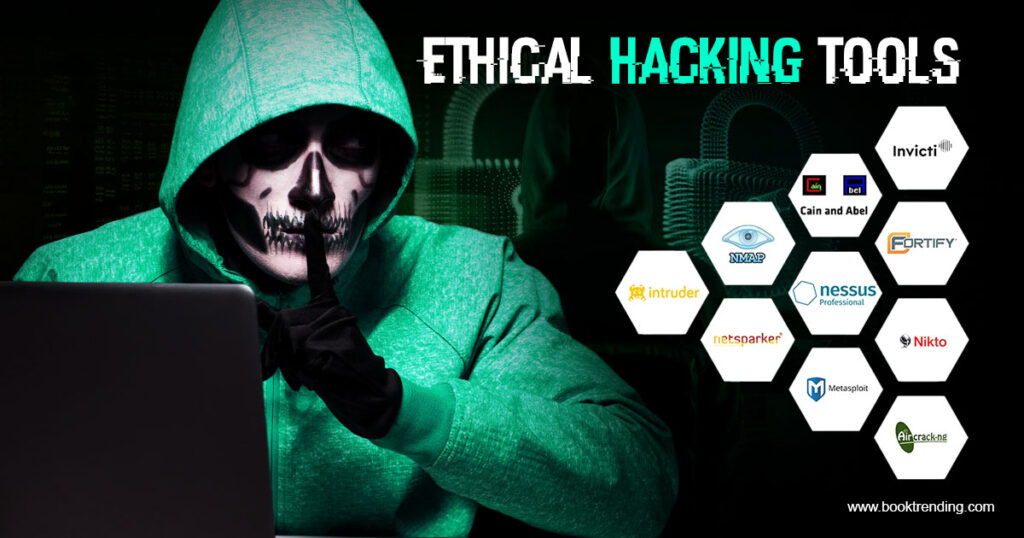
The rapid evolution of cyber threats has made ethical hacking an essential part of any organization’s cybersecurity strategy. Ethical hacking, or penetration testing, helps identify potential vulnerabilities in systems, networks, and applications before malicious hackers can exploit them. To stay ahead of these threats, ethical hackers rely on various specialized tools that allow them to mimic the tactics of malicious actors, uncover weaknesses, and fortify defenses.
In this article, we’ll explore some of the best ethical hacking tools to keep an eye on in 2024, providing cybersecurity professionals with the right arsenal to safeguard digital assets effectively.
1. Nmap (Network Mapper)
Nmap has been a staple in the ethical hacking tools world for years, and it remains one of the most powerful and versatile tools for network discovery and security auditing. Nmap allows ethical hackers to scan large networks efficiently, detecting open ports, services, and potential vulnerabilities.
Key Features:
- Comprehensive network mapping
- Port scanning
- Service detection
- Vulnerability detection
Nmap is an essential tool for ethical hackers who need to identify weak spots in a network before they can be exploited by cybercriminals.
2. Wireshark
Wireshark is one of the most popular tools for network protocol analysis. It allows ethical hackers to capture and inspect the data traveling across a network in real-time, helping them identify vulnerabilities, malicious activities, or potential breaches.
Key Features:
- Deep inspection of hundreds of protocols
- Live capture and offline analysis
- Network traffic analysis and visualization
Wireshark is crucial for detecting suspicious network traffic and analyzing vulnerabilities that might otherwise go unnoticed.
3. Metasploit Framework
The Metasploit Framework is one of the best-known tools for penetration testing and vulnerability assessment. Ethical hacking tools can use Metasploit to develop and execute exploit codes against target machines, simulating real-world attacks.
Key Features:
- Extensive library of exploits
- Custom payload generation
- Automated vulnerability testing
- Supports integration with other tools like Nmap and Wireshark
Metasploit’s ability to simulate a wide range of attacks makes it invaluable for testing system defenses and discovering weaknesses before cybercriminals do.
4. John the Ripper
Passwords are often the weakest link in any security chain. John the Ripper is a fast and powerful password-cracking tool used by ethical hackers to test the strength of passwords and find weak credentials that can be exploited.
Key Features:
- Cracks various password hashes
- Efficient brute-force attacks
- Customizable to test different password policies
By using John the Ripper, ethical hackers can help organizations identify weak passwords and implement stronger authentication measures.
5. Burp Suite
Burp Suite is an industry-standard tool for web application security testing. It allows ethical hackers to find vulnerabilities in web applications, such as SQL injections, cross-site scripting (XSS), and other critical flaws.
Key Features:
- Web vulnerability scanner
- Manual testing capabilities
- Supports automated and customizable testing
- Integration with other security tools
Burp Suite is a must-have tool for ethical hackers focused on web application security, providing them with the ability to thoroughly assess and fix potential vulnerabilities.
6. Aircrack-ng
Wireless networks are often a common target for attackers, which is why Aircrack-ng is essential for any ethical hacker’s toolkit. It is a comprehensive suite of tools used to assess the security of Wi-Fi networks.
Key Features:
- Cracks WEP and WPA-PSK keys
- Packet capture and export
- Network monitoring for suspicious activities
With Aircrack-ng, ethical hackers can test the robustness of Wi-Fi security and prevent unauthorized access to wireless networks.
7. Nessus
Nessus is a widely used vulnerability scanner designed to identify vulnerabilities in systems and networks before they can be exploited. It’s highly regarded for its ability to scan for a wide range of potential issues, including outdated software, weak passwords, and configuration flaws.
Key Features:
- Extensive vulnerability database
- Scans for network, system, and application vulnerabilities
- Generates detailed reports for remediation
Nessus is essential for continuous vulnerability management and proactive defense against cyber threats.
8. Kali Linux
Kali Linux is a Linux distribution specifically designed for penetration testing and ethical hacking tools. It comes pre-installed with hundreds of penetration testing tools, making it a one-stop solution for ethical hackers.
Key Features:
- Over 600 pre-installed tools for penetration testing
- Customizable for specific security needs
- Strong community support and regular updates
Ethical hackers can use Kali Linux to streamline their testing processes, ensuring they have all the tools they need to find and fix security gaps.
Conclusion
Ethical hacking is a vital practice in today’s digital landscape, where new threats are constantly emerging. By using the right tools, ethical hackers can stay ahead of cybercriminals and help protect sensitive data and systems. Whether you are a seasoned cybersecurity professional or just starting out, these top ethical hacking tools for 2024 will enable you to conduct comprehensive penetration tests and strengthen your organization’s defenses.
To maintain strong cybersecurity, keep these tools at your disposal and ensure you stay up to date with the latest trends and updates in ethical hacking practices.





